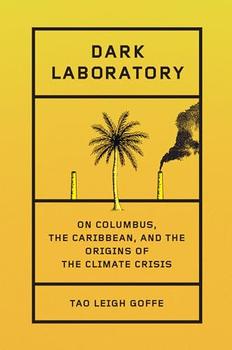Summary | Excerpt | Reviews | Beyond the book | Read-Alikes | Genres & Themes | Author Bio

On Columbus, the Caribbean, and the Origins of the Climate Crisis
by Tao Leigh GoffeWhen did globalization begin? Many authorities would place its start somewhere in the 20th century. But what if instead we think of the globalized modern era as beginning with Christopher Columbus's arrival in the Caribbean in 1492? How might this change how we think about the legacies of empire, colonialism, and the roots of climate crisis? For Tao Leigh Goffe, a writer, theorist, and artist who grew up acutely aware of how colonialism shaped the world, climate crisis and globalization are intrinsically linked to colonial pasts. In Dark Laboratory: On Columbus, the Caribbean, and the Origins of the Climate Crisis, Goffe draws from some of the humanistic work of her research lab (also called Dark Laboratory) to help readers make these connections and interrogate what we think we know about the origins of climate change.
Goffe's lab combines research on climate, race, technology, and philosophy, working from the premise that "climate crisis cannot be solved without solving racial crisis." Dark Laboratory merges art with research in ways that center marginalized communities and non-Western forms of storytelling. This book, she explains, "is an attempt to write neither a revisionist history nor a science textbook. Instead, [Dark Laboratory] brings together historical evidence and scientific methods to ask urgent, philosophical questions about whether we want to live differently." By connecting today's climate crisis directly to the beginning of colonial expansion, Goffe draws a clear line through centuries of contact and exploitation to show that we cannot solve our climate problems without recognizing the implicit racism and violence that underscore them.
The Caribbean becomes her main case study, but she also follows the historical resonances of this region to other parts of the world such as Hong Kong, India, and Tahiti, which share similar histories marred by extraction and colonialism, and are still dealing with the fallout of those histories today. For her, these connections must be made to better understand that the "genocide of colonial encounter is ongoing" and to reframe the current climate crisis as "the consequences of a centuries-long cycle of exploitation of people of color, whom European colonial powers have forced to extract resources from the earth." Additionally, she explores how and where resistance has always been present, whether resistance to a colonial or imperial incursion; resistance to modernization for modernization's sake; or resistance to climate change through the refusal to succumb to the idea that there is only one way of facing an uncertain future, or to accept that humanity cannot change how they might live with each other. Many of these resisters plan to build something better in the face of so much violence and damage.
Goffe's scope is wide-ranging and dotted with her personal history; she understands the world she inhabits through discovery and exploration of her ancestral connections, examining how her mixed heritage is inflected with the aftereffects of colonialism. In doing so she makes a too often intellectualized problem — how to solve climate change — deeply intimate.
By tracing history in this way, she deftly folds together intertwined historical threads to make visible ecological destructions, racialized violence, and even the multiple apocalyptic events survived by Black and Indigenous peoples across the globe at the hands of Western colonization. But despite the darkness she still sees opportunities for change. Goffe invites readers to recognize that the current ecological conditions are the result of a lack of imagination, not the inevitable path of history running its course. If readers can see different ways of understanding the past, they just might be able to imagine different futures. Dark Laboratory presents the complex, poetic, beautiful climate work of this generation, and its clarion call is sure to provoke and challenge, while also opening windows into worlds too often unseen.
![]() This review
first ran in the February 12, 2025
issue of BookBrowse Recommends.
This review
first ran in the February 12, 2025
issue of BookBrowse Recommends.

If you liked Dark Laboratory, try these:

by Jessica J. Lee
Published 2025
A prize-winning memoirist and nature writer turns to the lives of plants entangled in our human world to explore belonging, displacement, identity, and the truths of our shared future

by Zoë Schlanger
Published 2025
Award-winning Atlantic staff writer Zoë Schlanger delivers a groundbreaking work of popular science that probes the hidden world of the plant kingdom and reveals the astonishing capabilities of the green life all around us.
In war there are no unwounded soldiers
Click Here to find out who said this, as well as discovering other famous literary quotes!
Your guide toexceptional books
BookBrowse seeks out and recommends the best in contemporary fiction and nonfiction—books that not only engage and entertain but also deepen our understanding of ourselves and the world around us.